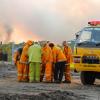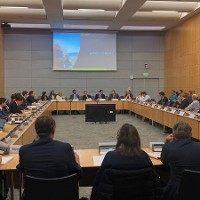
On 16th- 17th January 2020, Risk and Resilience Program Senior Science Advisor John Handmer, at the invitation of the OECD, attended the 'Adapting to a changing climate in the management of wildfires' conference where he spoke on Understanding the socio-economic costs of wildfires, Wildfire impact in the "new normal".
 © OECD Conference
© OECD Conference
Professor Handmer noted that ''the conference is about the changing risk presented by the warming climate, and the transformations needed to deal with this change. The IIASA Risk group is seeking an enhanced engagement with the OECD, and my participation in this meeting is dedicated to that end''.
Professor Handmer continued on to say, ''the organisers of this conference could not have imagined how much more salient this meeting, on adapting wildfire management to climate change, became as a result of the current Australian fires. The OECD (OECD Joint Adaptation Task Force) and the European Project PLACARD (the European research platform on Climate Change Adaptation and Disaster Risk Reduction) co-organised the conference well before the current wildfires drew global attention to the problem. The meeting started with an update on the fires from the Australian Ambassador to the OECD – reminding us that losses so far included over 17 million hectares burnt and a billion animals lost with massive economic disruption – and continuing. A conference theme was that we appeared to be entering a different fire risk environment, a so called “new normal”, although not all speakers engaged with this''.
Conference Presentations
Speakers at the conference engaged in discussions on:
- Aligning public policy to effectively manage wildfires
- The role of innovation and technology in wildfire management
- Effective risk transfer mechanisms for wildfire management
- Understanding the socio-economic costs of wildfires and What is – or will be- the new normal in wildfires
''My task was to present on wildfire impacts, and I did this by drawing on the Australian fires to highlight the very large ecosystem service impacts and disruption to all aspects of life and economic activity. A substantial proportion of these types of losses are public goods, concern public health, and are uninsured. As the conference had a sub-focus on insurance these areas of major loss received relatively less attention, while insurable losses and residential loss modelling were well covered. Insurance is very important in enabling people to recover, as the large building losses in recent fires in North America and Australia testify. Some long standing issues resurfaced: for example some participants commented that as people chose to live in the flammable forest, they accepted that risk and shouldn’t be allowed to rebuild after disaster. For many in Australia however, it is housing affordability that is an important reason people live where they do. We did not have the opportunity to discuss why individuals should be somehow held responsible for their losses in locations with strong planning and building code systems.
The Californian Insurance Commissioner broadened the discussion by talking about having the industry play its part in adapting to climate change and sustainability, suggesting that insurance could play a larger positive role. The insurance discussions touching on the idea, role and limitations of insurance were one of the highlights for me. Other highlights, among the presentations by leading wildfire specialists from Europe and North America, included the wide ranging opening session outlining the challenge posed by climate change and wildfires, and the policy session.
The meeting started by acknowledging that as far as wildfire risk goes, we are probably in a different era with exposure and risk set to grow. Assuming this is the case, then tweaking well-established approaches to the risk management of wildfires will not make much difference to the outcome. Some conference participants talked about the details of risk modelling. Such modelling is essential, but it needs to be set within an understanding of the evolving complex cascading risks that wildfires are becoming. The conference made a solid start on this''.
Upcoming Events
The Orient Jakarta, a Royal Hideaway Hotel Jalan Jendral Sudirman No. 36, Bendungan Hilir, Kecamatan Tanah Abang, Kota Jakarta Pusat, Daerah Khusus Ibukota Jakarta, 10210
